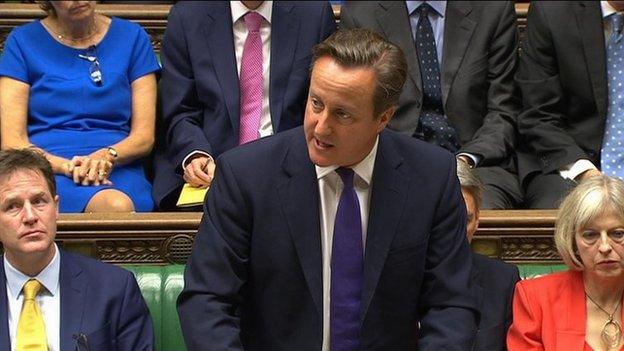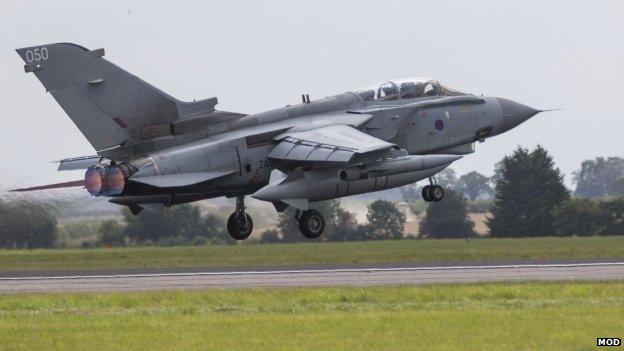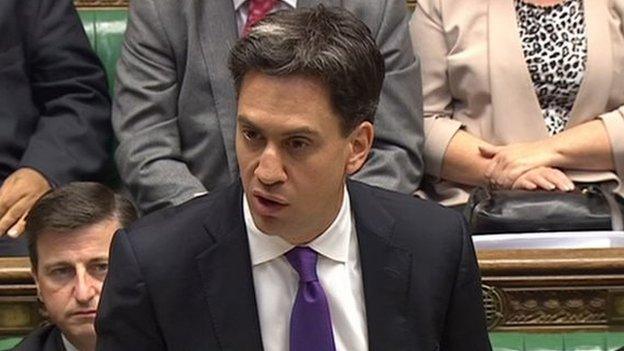British military action in Iraq: what next?
- Published

If/when the House of Commons votes for air strikes against IS forces in Iraq the next steps are becoming increasingly clear.
Air strikes this weekend
In theory, six RAF Tornado strike aircraft could be in action over the skies of Iraq as early as this evening [Friday] but I understand that it is more likely on Saturday night/Sunday morning - one reason might be to avoid air strikes taking place on the Muslim holy day.
Early strikes may not be followed by daily sorties since the attacks will not be focussed on the fixed targets of a state - military bases, airfields, bridges etc - but, instead, on the moving targets of a "rebel" force making military advances.
There was a six day gap between the first and second series of strikes (19 September followed by 25 September) by the French airforce. David Cameron says this action is more about "patience and persistence" than "shock and awe".

The RAF's contribution is modest by historic standards - three times as many planes flew over Libya. It is comparable with other countries joining this Coalition which includes, so far, seven Danish F-16s, six Dutch F16s, six Belgium F16s, six French Rafale fighters and six Australian F/A-18s. Both Saudi Arabia and the UAE contributed 10 aircraft each to recent strikes in Syria and have hundreds more at their disposal. The United States has 70 aircraft aboard the carrier USS George H W Bush and scores of other aircraft at various air bases around the region.
A return of a small number of British troops to Iraq soon
The Commons motion states that troops will not be deployed in "ground combat operations" in Iraq. However, Downing Street say that small numbers of troops could be used to guide in air strikes, to help in humanitarian operations and, possibly, to train Iraqi and Peshmerga forces (although this may take place in neighbouring countries such as Jordan).
The government would not extend military action in Syria without a Commons vote unless there is an urgent humanitarian need to do so the prime minister's official spokesman has said pointing out that the PM has pursued a "very deliberate and measured approach and the PM been determined to keep consensus".
Calls for airstrikes to be extended into Syria
Many MPs said there was no military or strategic logic in attacking targets in Iraq but not Syria when the border between the two now no longer really exists. One well-placed source told me that attitudes to strikes on Syria would change once people saw the success of action of the ground in Iraq - the first target, I was told, was the fall of Mosul in late October or November.
The prime minister has made it clear that he believes that there is a legal as well as a moral case for military action against IS in Syria as well as Iraq. He cited Article 51 of the UN Charter, which covers an individual or collective right to self-defence against armed attack.

The US has already used this article to justify its attacks on Syria as a way of helping the Iraqi government to defend itself - in a letter to the UN secretary General, the US Ambassador wrote that "states must be able to defend themselves ... when, as is the case here, the government of the state where the threat is located is unwilling or unable to prevent the use of its territory for such attacks,"
Labour's Ed Miliband has said he agrees with that but spelled out three problems with taking action in Syrias as well.
It would be "better", he said, before adding "I put it no higher than that", to secure a UN resolution.
Privately, Labour figures accept that any such resolution could be vetoed by Russia but think it would be preferable to be seen to try.
In addition, he said it was unclear which ground forces air strikes would be used to support in Syria (unlike in Iraq where the Iraqi army and Peshmerga are playing the role) and what the desired end game was.
There may or may not be another Commons vote first
The prime minister said he would not extend "pre-meditated" military action in Syria without a Commons vote but added that he reserved the right to act if there was an urgent humanitarian need to do so. This will fuel the fears of some MPs that he will look for an excuse to extend action without first seeking the agreement of the Commons.
It is worth remembering that military action in Libya began before a Commons vote because there was said to be an imminent threat of large scale loss of life in Benghazi.
British military involvement will last a very long time
The defence secretary has said we're in for the long haul which might, he said, mean two or three years.
In truth, of course, neither he nor anyone else can know how long this - whatever this is - will take.